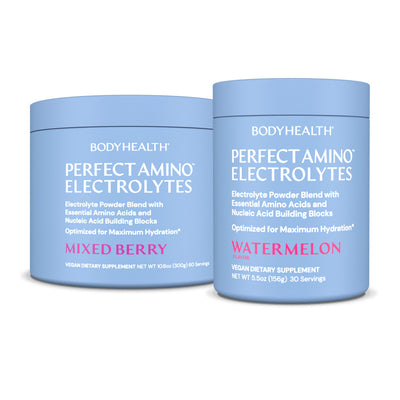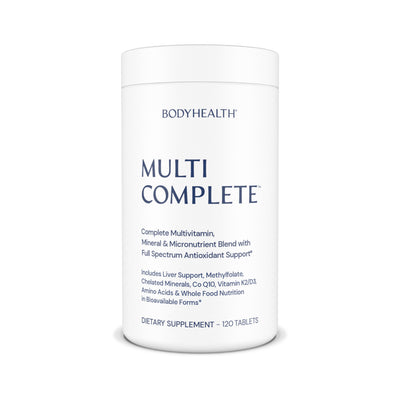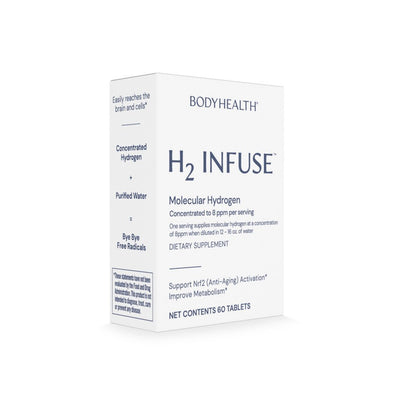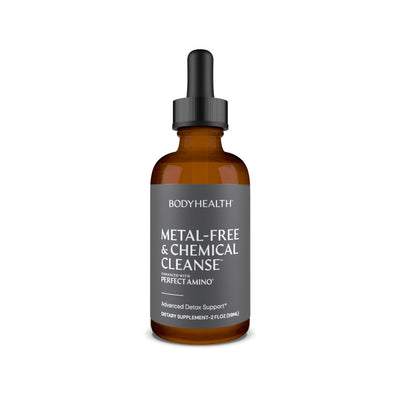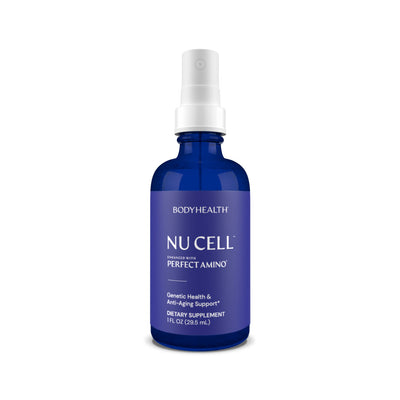Maximizing Cellular Function For Endurance & Recovery
April 04, 2024 6 min read

We know about amino acids, hormones, and how different foods affect our ability to build lean muscle, burn fat and stay healthy.
But if we want to achieve maximum levels of energy, recovery, health and performance, and build the most lean muscle, then we need to go down to the cellular level.
After all, our bodies are just one big mass of some 100 trillion cells all bonded together.
How well we're doing is an exact reflection of how well our cells are doing.
And they require a multitude of nutrients and biochemicals, all held in equilibrium, to ensure they can work properly, produce energy, build muscle, and keep our body going.
When these aren't properly balanced we can get headaches, brain fog, low levels of energy, muscle cramps, slower recoveries from workouts, and imbalances in hormones.
But when everything is in place, we have the most powerful you that you can be.
So let’s see how this works.
MITOCHONDRIA: THE TINY ENGINES IN OUR CELLS
In every cell, microscopic organelles called mitochondria exist.
Their main job is to take in oxygen and nutrients from food (sugar, fat and amino acids) to produce something called ATP (adenosine triphosphate). This is the fuel that your cells use to function and do their job.
We’ve already spoken about how poor blood flow and narrowed blood vessels affects our ability to get oxygen to our cells.
But what about when the cells can take in the oxygen and fuel in the first place, or the mitochondria can’t convert them into ATP?
Then our energy levels would lower, protein synthesis would go down, and our ability to repair and build muscle would decrease.
Or what about the cells ability to communicate to other cells, or up and down the nerve channels to the brain and back?
When cellular communication is stopped or slowed we get decreased reaction time, muscle cramps, headaches and even hormonal dysfunction.
This is where specific minerals called electrolytes come in.
ELECTROLYTES, ENERGY, HYDRATION AND CELLULAR HEALTH
Most people think of electrolytes as something to take when they’re dehydrated. And this is true.
But there’s much more to it than that.
The amount of water in our cells directly corresponds to their ability to take in oxygen and nutrients, use those nutrients, and expel waste.
This is so much the case that just a 2% drop in body weight from loss of fluid can significantly lower athletic performance, bringing on tiredness, headaches, slow recovery from workouts, brain fog and nervous tension.
And we get at least that much of a drop every time we work out or go for a long run.
That's part of the tiredness afterwards, it's not just: "being tired after a workout."
But drinking water alone doesn’t fix this. You could drink all the water in the world and still be dehydrated.
In fact, when you are dehydrated, only drinking water can actually dehydrate you more.
This is because of specific minerals called electrolytes: sodium, potassium, calcium, magnesium and others.
These electrolytes are what allow your cells to bring in or release water. They actually regulate how much water is in your cells and blood.
When our electrolytes are low, water is less able to enter the cells no matter how much we drink.
This then makes it harder for nutrients and oxygen to enter the cell or for toxic waste to be released.
Free radicals can then build up inside the cell, raising cortisol that decreases protein synthesis for muscle building.
And without two of the electrolytes, magnesium and calcium, your mitochondria couldn’t even produce ATP in the first place. And if your mitochondria can't produce ATP, your energy levels go down.
But electrolytes do more.
ELECTROLYTES AND THE NERVOUS SYSTEM
As I said, your body is just one big conglomeration of trillions of cells. As such, for it to operate at all, these cells need to be able to communicate with each other and with the brain.
Some 20,000,000,000,000,000 bits of data are transmitted each second.
Just a little bit.
And electrolytes are what allow these signals to be passed back and forth.
But these electrical charges are moving at a couple hundred miles per hour. And this speed is different for different areas or depending on the activity the body is engaged in.
Everything depends on these signals moving at the speeds needed: your heart, your blood flow, your ability to move and how fast your can move, your ability to think, the proper functioning of each of your organs, your endurance, your ability to recover, protein synthesis, fat break down, and much more.
So when this system breaks down, it can bring on a wide range of "unexplainable" symptoms.
It can cause irregular heartbeat, fast heart rate, fatigue and lethargy, nausea and vomiting, diarrhea or constipation, abdominal cramping, muscle cramping, muscle weakness, irritability, confusion, headaches and even numbness or tingling.
It's a lot more than just being thirsty.
WORKING OUT, HYDRATION & ELECTROLYTES
When we work out, our cells have to work harder to produce more ATP and to use it.
Electrolytes are necessary for this, both to allow nutrients and oxygen in to create ATP, and for ATP's creation within the mitochondria.
But when we workout, we sweat. And we lose these electrolytes through our sweat.
If we just drink more water, this further dilutes the electrolytes and we end up losing even more, and it's the electrolytes that ensure water goes into your cells. So this can actually cause further dehydration.
But this loss of electrolytes can cause lowered ATP production and protein synthesis and leads to not only lower energy due to this, but slower recoveries and less muscle building. It can even prevent good sleep.
Normally we would get these electrolytes from our foods and water sources. However, with modern foods, these are mostly processed out of the foods, and bottled or filtered water also removes them.
This is why we have electrolyte powders.
Taking electrolytes during or after a workout helps replenish these lost electrolytes resulting in significantly higher energy levels, faster recovery, greater endurance, a calmer mood, softer skin (not dehydrated), less or no muscle cramping, and increased mental awareness and ability.
ELECTROLYTES AND AMINO ACIDS
When we sweat, we also lose amino acids. While these are necessary for protein synthesis (obviously) they’re needed for something else as well.
Amino acids (along with glucose) help your cells to take in and use electrolytes and water, and help keep the intracellular water levels higher over time for increased hydration.
Electrolytes depend on them for their own effectiveness.
That’s why we added PerfectAmino to our electrolytes.
When you take PerfectAmino Electrolytes, you’re not only getting the exact ratio of minerals your cells need for perfect hydration and high performance cellular production, you’re also getting the exact amino acids your cells need for effective absorption and use of the electrolytes.
We recommend taking one serving of PerfectAmino Electrolytes during or after a workout or long run for increased energy and recovery.
Try it and see. It makes quite a difference.
If you haven’t seen the Lean Body/Lean Bulk Program, check it out and do the 30-Day Challenge. It’s very effective.
And make sure to join our VIP Group where you can ask any question you have and get only the best answers.
Index To The Lean Body/Lean Bulk Guide:
Introductory Articles:
Getting Started:
- The Lean Body/Lean Bulk Guide & 30-Day Challenge
- Hormones: The Third Dimension of Calorie Cutting
- The Lean Body/Lean Bulk Diet
Supplements & Macros By Goal:
- Supplements & Macros For Lean Body
- Supplements & Macros For Beginner To Moderate Lean Bulking
- Supplements & Macros For Advanced Lean Bulking
Workout Regimens & Exercise Videos:
- Beginner to Moderate Level Workout Regimen
- Advanced Workout Regimen
- Lean Body/Lean Bulk Exercise Videos
Week One:
- Metrics & Key Data For Week One
- How BCAAs Build Body Fat & Lower Health Over Time
- The Importance Of Complete Protein Digestion
Week Two:
- Dialing In Our Macros For Lean Muscle: Hormones & Cravings
- How Cortisol Breaks Down Muscle & Prevents Protein Synthesis
- How To Improve Growth Hormone, Testosterone & Protein Synthesis
Week Three:
- Thyroid, Estrogen & Progesterone: Speeding Fat Loss & Lean Muscle Creation
- Improving Sleep: Muscle Building, Fat Loss, Mood & Aging
- Maximizing Cellular Function For Endurance & Recovery
Week Four:
- Raising VO2 Max: Endurance, Performance & Recovery
- How Toxins Affect Our Hormones: Building Muscle & Fat Loss
- Blood Flow For Muscle, Fat Loss & Overall Health
Final Week:
Articles by Health Topic
Your Path To Better Health Starts Here!
From in-depth articles on nutritional benefits to updates on new product launches, stay informed and inspired on your journey to optimal health.
*These statements have not been evaluated by the Food and Drug Administration. These products are not intended to diagnose, treat, cure, or prevent any disease.
